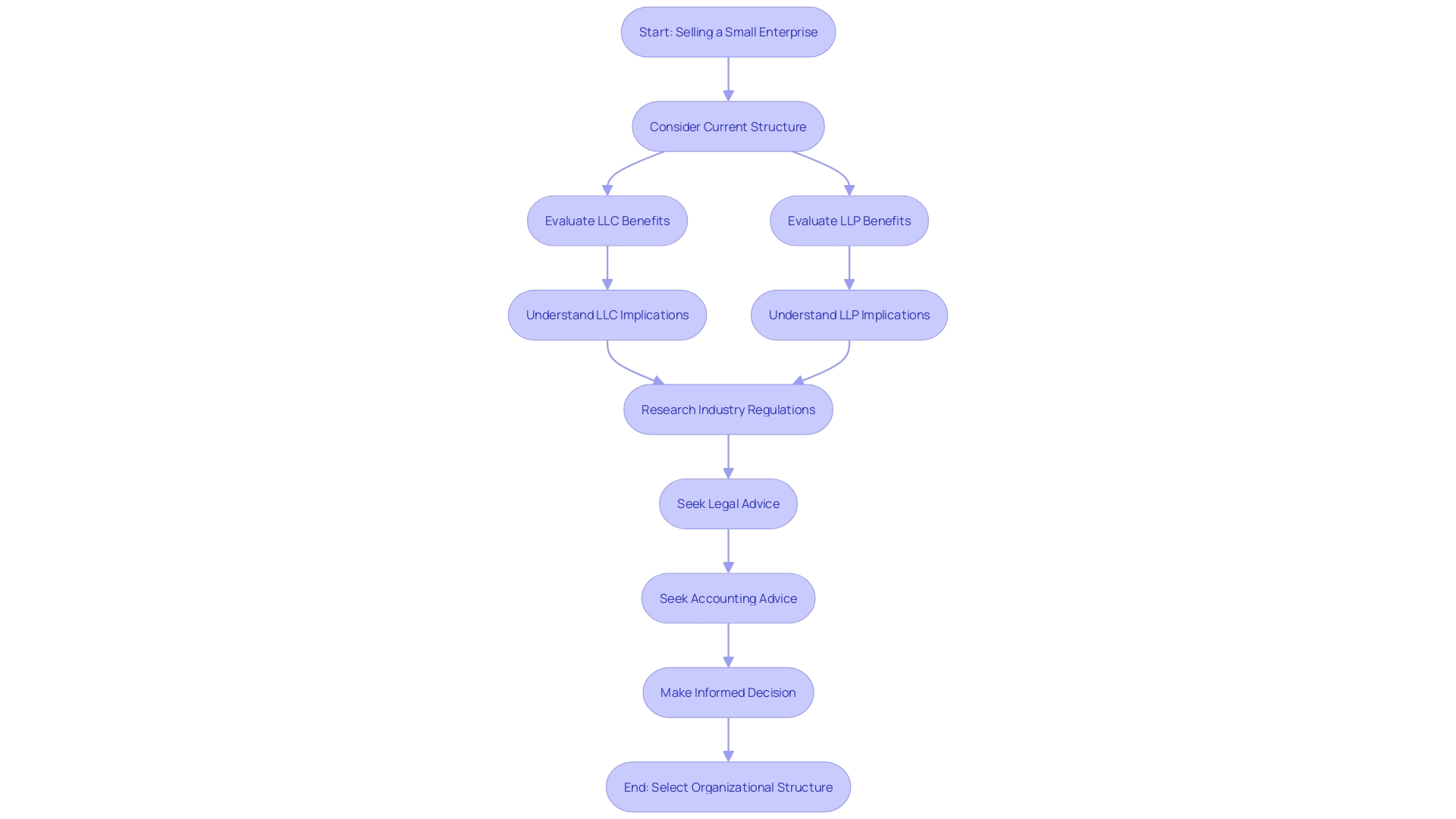Introduction
Are you considering selling your business in Connecticut? Making the right sales structure choice is crucial and can have significant consequences on your financial outcome. In this article, we'll explore the differences between asset sales and stock sales and their tax implications.
We'll also discuss the importance of choosing the right business structure for sale and understanding legal requirements and registration in Connecticut. Additionally, we'll delve into tax considerations, financial planning, ethical obligations, timing, and the involvement of professional advisors. Furthermore, we'll touch on contract law and sales contracting processes, economic development incentives, infrastructure considerations, and marketing strategies for a successful sale.
By gaining insights into these topics, you'll be better equipped to navigate the complexities of selling your business and ensure a favorable and profitable outcome.
Understanding Asset vs. Stock Sales
Selecting the appropriate sales framework is essential when marketing your company in Connecticut, and it primarily comes down to two primary methods: a property transaction or a stock transaction. In a transaction involving the transfer of different company properties and obligations directly, you're dealing with it. This could range from equipment to receivables, each with its own tax implications. On the other hand, a stock transaction transfers ownership through the exchange of the company's stock, which can be a simpler proposition in certain corporate structures like C corporations and S corporations.
The path you choose will have significant consequences on your financial outcome, especially when it comes to capital gains. A capital gain, which is the profit from the transaction, or a loss if the transaction nets less than your investment, is influenced by several factors, including the depreciation of properties and any capital improvements you’ve made. For instance, if your initial investment in a venture was $200,000, with an additional $100,000 spent on enhancements, and you sell your enterprise for $350,000, your capital gain is $50,000.
This calculation is just the tip of the iceberg. Tax rates on short- and long-term capital gains will vary depending on whether it's a stock or asset transaction, which underscores the significance of comprehending your tax obligations to maximize your net profit. Remember, every piece of machinery or equipment has a value that includes not just the purchase price but also additional costs like installation and training.
Given the complexity of such transactions and their potential to be the most significant financial deal of your life, it's advisable to seek guidance from a fee-only financial planner. This specialist will assist you in maneuvering through the tax environment without offering you unnecessary items, relying on knowledge from comparable transaction scenarios.
It's a sobering thought that although many small enterprise owners plan to exit their enterprises upon retirement, very few have a concrete exit strategy in place. While contemplating the ideal age to retire and the means to finance it, take into account the divestment of your enterprise as a crucial component of your retirement strategy. Interact with experts who grasp the intricacies of both stock and asset transactions to guarantee the optimal financial result for your life after retirement.

Choosing the Right Business Structure for Sale
Embarking on the sale of your small enterprise in Connecticut is a journey that requires meticulous preparation, especially when deciding on the most advantageous organizational structure. The framework you choose will significantly impact the legal and financial aspects of the transaction. For example, if you operate as a sole proprietorship, transforming into a Limited Liability Company (LLC) might offer the benefit of limiting personal liability and enhancing the business's credibility. An LLC combines the protective elements of a corporation with the tax advantages of a partnership, safeguarding your personal properties from business-related debts.
Alternatively, if you're a member of a professional organization like a law or accounting firm, switching to a Limited Liability Partnership (LLP) could protect each partner's personal property from the professional negligence of others within the organization. The subtleties of deciding between a stock transaction and a selling of property are equally important. A stock sale involves the transfer of ownership via shares and might suit C and S corporations, while an asset sale, focusing on tangible and intangible assets, could be more beneficial for different tax reasons.
Before deciding on your direction, take into account the experiences of similar enterprises. For instance, in the child care industry, understanding the sector's unique regulations is essential for a smooth transition. Take a cue from recent market analyses and successful transitions in Connecticut, where comprehensive planning has been key to overcoming hurdles in regulatory approval and ensuring operational continuity.
Informed decision-making is your compass in this process. Consult with attorneys and accountants to navigate the complexities of your unique situation. Their knowledge can light up the way ahead, guaranteeing that your company structure aligns with your objectives for the transaction and your vision for life afterwards.

Legal Requirements and Registration in Connecticut
When contemplating the disposal of your enterprise in Connecticut, it's crucial to comprehend the options you'll be confronted with, such as choosing between a stock transaction or an asset transaction. Each carries its own legal and financial implications, particularly in terms of capital gains, which is the profit from the transaction of your investment. For example, transferring ownership of your business as a stock transaction means the buyer is acquiring your shares and assuming control, which is typical in C corporations and S corporations due to their structure. Alternatively, a transaction involving the company's physical property and capital assets would include disposing of them.
The approach you select not only impacts your tax responsibility but also the overall worth you can derive from the transaction. Calculating this value includes examining not just the purchase price of your assets but also additional costs such as installation and operational training. It's crucial to carefully plan for the financial and tax aspects of the transaction, as these can greatly affect your net profit.
Moreover, with recent events highlighting the importance of timely commercial transactions, such as Yale New Haven Health's acquisition of hospitals, which faced over a year of regulatory approval, the urgency of understanding and complying with legal processes becomes clear. The intricacy of contemporary commercial operations, which may extend across state borders, requires expert legal and financial guidance to guarantee adherence and maximize the conditions of the transaction.
As you embark on this journey, remember that selling your company is not just about a financial transaction but also about understanding the value you've created and how it will be carried forward. With thorough preparation and expert guidance, you can navigate the process successfully and with confidence.

Tax Considerations for Business Sales in Connecticut
Navigating the complexities of selling your business in Connecticut requires a keen understanding of the tax landscape. The decision between a stock transaction or an asset transaction is a pivotal one. In a stock transaction, you're transferring ownership via shares, which is common among corporations. On the other hand, an asset transaction involves disposing of tangible company assets, each with its unique tax considerations, particularly in relation to capital gains taxation.
Capital gains are the profits from disposing of your enterprise; the amount by which the transaction price exceeds your initial investment. For example, purchasing a business at $200,000, investing $100,000 in improvements, and selling for $350,000 results in a $50,000 capital gain. It's essential to remember that factors like depreciation and capital improvements can influence your capital gain amount, thereby affecting your tax liability.
Furthermore, the differences in immediate and extended capital gains taxes between stock and property transactions cannot be emphasized enough. These differences are crucial for a tax-efficient strategy. When valuing your enterprise assets, remember to consider all associated costs, not just the purchase price, to ensure a comprehensive calculation.
It's also beneficial to stay informed about broader tax climates and policies that may impact your sale. For instance, the absence of specific taxes can be a favorable aspect in some states according to the State Business Tax Climate Index. Understanding the interplay of these factors with your unique situation is crucial.
Ultimately, the complexities of commercial transactions and their tax consequences emphasize the significance of seeking advice from a tax specialist who specializes in this area. They can guide you through the tax strategies that best suit your sale, aiming to optimize your financial outcome while minimizing tax burdens. Remember, this information serves purely for your enlightenment and should not replace professional legal advice.
Financial Planning and Valuation
When preparing to sell your small company in Connecticut, a crucial step is to meticulously analyze your financials and establish a concrete value for your enterprise. This involves more than just a cursory glance at your books; it requires a deep dive into your holdings, investments, and the market trends that could influence your business's worth. To navigate a transaction, one must decide between a stock sale, where the buyer takes over the seller's shares, and an asset sale, which includes the transfer of tangible assets like property and equipment. The selected approach will greatly impact both the capital gains realized from the transaction and the subsequent tax consequences.
Understanding capital gains is vital in this process. A capital gain represents the profit from selling your enterprise, calculated by the difference between the initial investment and the final transaction value. This gain, or loss if the sale results in a deficit, can be influenced by different factors, such as the depreciation of equipment or the cost of capital improvements made to the company. For instance, if your initial purchase was $200,000, and you invested $100,000 in improvements, but sold for $350,000, your capital gain would be $50,000.
Expert advice underscores the importance of a precise valuation. Failing to achieve an accurate assessment can result in undervaluing your enterprise or overpricing it, which could deter potential buyers. An appraiser or valuation professional can offer an impartial assessment by analyzing financial statements, resources, customer base, and industry trends. This assessment is not just a number; it's a strategic tool in negotiations and ensures that you do not settle for less than your company's market value.
Furthermore, when valuing assets for a company, it's crucial to consider all associated costs, not just the purchase price. This includes expenses for installation and training employees on new equipment. These details can greatly affect the overall valuation of your company and, in the end, the final deal.
In the context of a evolving market, as observed with the difficulties faced by mansion owners in Los Angeles due to a sluggish housing market and high transaction taxes, having a strong comprehension of your company's worth is more crucial than ever. With 61 being the average retirement age, as per a 2022 Gallup analysis, owners looking to retire must have a clear exit strategy that includes a comprehensive financial analysis and valuation to secure their future post-sale.
Ethical and Disclosure Obligations
Understanding the complexities of a business transaction in Connecticut requires a commitment to transparency and ethics. With a diverse real estate portfolio that spans Fairfield County, Marsha Charles demonstrates the epitome of integrity in real estate transactions. Known for her 'easy on the nerves' style and exceptional listening skills, Marsha has ensured client confidence and satisfaction for over two decades. Her approach is a benchmark for sellers in any industry, where honesty and detailed disclosure form the bedrock of a successful transaction. Preserving privacy and following the lawful regulations are essential components of the selling procedure, similar to the principles at Manchester City Nissan, where customer confidence and contentment are of utmost importance despite recent legal disputes. As you contemplate the transaction of your enterprise, bear in mind that the decision between a stock transaction and an asset transaction can significantly impact your capital gains consequences, a choice that necessitates comprehensive financial preparation and expert guidance. By accurately assessing the value of your enterprise and maintaining ethical principles, you can successfully navigate the intricacies of the transaction process with assurance, guaranteeing an equitable and lucrative result.
Timing and Professional Advisors
Choosing the right time to sell your Connecticut-based enterprise can make all the difference between a favorable agreement and an outstanding one. Beyond just timing the market and keeping an eye on industry fluctuations, you must also weigh your personal readiness to part with your venture. Essential to this process is the enlistment of experienced professionals who can navigate the intricate terrain of a sale. Business brokers, legal advisors, and financial experts bring to the table a wealth of expertise that could significantly bolster the likelihood of a favorable outcome.
Before you embark on this journey, it's paramount to understand the true value of your enterprise. A common pitfall for many owners is skimping on a comprehensive valuation, which can result in undervaluing or overpricing the enterprise—both scenarios being equally detrimental. A professional appraisal will dissect your financials, consider your assets, scrutinize your customer base, and factor in industry dynamics to arrive at a fair market valuation. This evaluation is not just about getting the numbers correct but also about ensuring that you don't settle for less than what your company is worth.
Keep in mind, the value of your company is not only determined by raw financial metrics like EBITDA or revenue. Adjusting for one-time events, non-core expenses, and accounting anomalies is vital. This is where a Quality of Earnings (QOE) report shines, offering an in-depth and adjusted view of your company's genuine financial performance, serving as a beacon during transaction discussions.
As you consider offers, reflect on your company's trajectory over the next decade. This foresight can be your guide in determining whether an offer aligns with the potential you envision. An informed decision comes from a place of understanding and confidence in the value you've built within your company.
Contract Law and Sales Contracting Processes
Managing the intricacies of business transactions in Connecticut necessitates a skillful touch, particularly in terms of legal matters. Creating and bargaining a agreement for transactions is more than just paperwork; it's about designing a blueprint for the transaction. The agreement should clearly outline crucial elements such as the sale price, payment schedules, warranties, and any contingencies that might arise. It's a strategic move to engage with a specialist contract attorney, who can ensure that your interests are safeguarded and that every clause in your contract is bulletproof legally. Remember, this document isn't just a formality—it's your security net, legally speaking, in the event of disputes or breaches. Contracts serve as more than just formal agreements; they're a testament to the understanding between buyer and seller, holding both parties accountable and providing peace of mind that the enterprise you've nurtured is transitioning into the right hands with clear expectations set. In today's digital age, leveraging technology such as DocuSign can streamline this process, offering speed and legal alignment, ensuring you can move forward confidently. It's crucial to be proactive and methodical in this process, as the agreement serves as a foundation for the legal transfer of your enterprise, reflecting not only a change in ownership but the culmination of your hard work and dedication.

Economic Development Incentives and Infrastructure Considerations
When thinking about the sale of your small enterprise in Connecticut, harnessing economic development incentives and grasping the significance of infrastructure is crucial. The Constitution State is full of programs aimed at enhancing economic growth, which can make your enterprise more appealing to prospective buyers. For instance, the recent designation of 31 technology hubs by the Biden administration, including in Connecticut, underscores the government's commitment to fostering innovation and job creation.
Assessing your company infrastructure, such as its location and accessibility, is also crucial in attracting buyers. Take Erica and Dave's experience in Bristol, Connecticut, for example. Their success story was partly due to the town's historic charm and the local government's focus on revitalizing the downtown area, which boosted the town's economic appeal. Similarly, aligning your company with such thriving environments can significantly enhance its marketability.
Moreover, when preparing for a sale, it's essential to determine the nature of the transaction, be it a stock sale or an asset sale, as each has distinct tax implications and can affect your capital gains. Grasping these financial intricacies is crucial, as emphasized by professionals such as Stephanie Wells of Formidable Forms, who advises on the significance of a comprehensive evaluation of your company.
The Center for Economic Accountability also highlights the importance of transparency and informed decision-making in economic initiatives, which is equally relevant when selling your company. By utilizing these insights and positioning your company within Connecticut's supportive economic environment, you're setting the stage for a fruitful and advantageous transaction.
Marketing Strategies for a Successful Sale
Creating a remarkable sales approach for your Connecticut enterprise transaction involves more than simply displaying a 'For Sale' sign. It's about understanding your position in the market, pinpointing your strengths, and setting clear, achievable objectives. Think of it as delivering a compelling sales pitch, one that grabs attention, establishes trust, and shares the distinctive narrative of your enterprise.
To begin, utilize platforms like BizBuySell, the largest online marketplace for enterprises, providing a variety of choices customized to various industries and budgets. Here, you can not only list your enterprise but also gain insights from resources like their free ebook on purchasing a small trade.
The advancement of digital marketing means personalization and interactivity are at the forefront of engaging potential buyers. Integrate polls, quizzes, and other interactive elements into your marketing efforts to create a memorable experience for your audience.
Remember, your marketing strategy should reflect the evolving landscape as seen in recent trends. With AI and community creation becoming increasingly significant, your approach must be innovative and adaptable, just as Doppler shifted its focus to secrets management when facing a crossroads.
Finally, don't overlook the power of primary research. Surveys can offer invaluable insights into customer satisfaction and perceptions, helping you refine your pitch and connect with the right buyers. By embracing these dynamic strategies, you're setting the stage for a successful sale that resonates with prospective buyers who see the true value of your Connecticut business.
Conclusion
In conclusion, selling your business in Connecticut requires careful planning and consideration. The choice between an asset sale and a stock sale has significant financial implications, so understanding the tax obligations is crucial. Seeking guidance from a fee-only financial planner can help navigate the complexities and maximize your net profit.
Choosing the right business structure is essential. Consulting with legal and financial experts can ensure informed decisions that align with your goals. Complying with legal requirements and understanding registration processes is vital for a successful transaction.
Tax considerations play a significant role in selling your business. Valuing your business accurately and staying informed about tax climates can optimize your financial outcome. Seeking the expertise of business appraisers and valuation professionals is crucial.
Ethics and transparency are paramount. Upholding ethical standards and valuing your business accurately can navigate the complexities with confidence. Timing and enlisting professional advisors are critical for a favorable outcome.
Navigating the legalities requires attention to detail. Crafting a well-drafted sales agreement with a specialist contract attorney safeguards your interests. Capitalizing on economic development incentives and understanding infrastructure considerations can enhance marketability.
Effective marketing strategies are essential. Leveraging online platforms, embracing digital techniques, and conducting primary research can attract the right buyers. With careful planning and professional guidance, you can successfully sell your business in Connecticut and achieve a favorable and profitable outcome.




